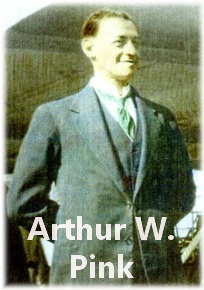This chapter is divided into six sections.
The Presbyterian Denominations. There are five paragraphs under this subheading. Since most of my readers are Baptists and not Presbyterians, I will mention only names and institutions. J. Gresham Machen left Princeton Seminary in 1929 to form Westminster Seminary in Philadelphia and left the Northern Presbyterian Church to help found what became the Orthodox Presbyterian Church.
Also mentioned are Carl McIntyre,
the Bible Presbyterian Church, the Evangelical Presbyterian Church, the Reformed Presbyterian Evangelical Synod, Covenant Theological Seminary and Covenant College, and Biblical Theological Seminary.
Leading Presbyterian Theologians. Seven paragraphs. Loraine Boettner,
the author of The Reformed Doctrine of Predestination, The Millennium, Roman Catholicism, Studies in Theology, and Immortality. Also mentioned are Gordon H. Clark, Edward John Carnell, Carl F. H. Henry, Ronald Nash, John Robbins, and Gary Crampton. The well-known Bible Presbyterian missionary to Switzerland, Francis Schaeffer,
studied at both Westminster and Faith seminaries and authored The God Who Is There, Escape From Reason, He Is There And He Is Not Silent, and How Should We Then Live? Toward the end of his life, he became involved in the pro-life movement and cowrote Whatever Happened To The Human Race? with C Everett Koop, M.D., who later became Surgeon General of the United States. Donald Gray Barnhouse, James Montgomery Boice, Philip Ryken, John Gerstner,
R. C. Sproul,
Rousas J Rushdooney,
Gary North, Ligon Duncan, D. James Kennedy,
and Alan Cairns of North Ireland are also mentioned.
Dutch-American Calvinists. Five paragraphs, mentioning Norman Vincent Peale,
Robert Schuller,[1]
the Christian Reformed Church based in Grand Rapids, Michigan, Calvin College and Calvin Theological Seminary, and the publishing houses of Eerdmans, Baker, Zondervan, and Kregel. Mention is made of the encroachment of neo-orthodoxy, the names of a number of men most Baptists would not recognize, and the extremely prolific Joel R. Beeke.
Baptist Calvinists. Nine paragraphs. “Up until the early 1900s, a large number (perhaps most) of Baptists in America were Calvinistic, differing with Presbyterians and Dutch Reformed mainly on baptism.” By far, the largest Baptist group in America is the Southern Baptist Convention. Most of the founders of the SBC were Calvinists. Theologians like Curtis Vaughn and preachers like Ernest Reisinger
and the Founders Ministries asserted the Calvinism of the Southern Baptist Convention’s founders. Leaders of the Calvinist resurgence have included Thomas Ascol,
Thomas J. Nettles,
Timothy George, and Mark Dever. Several at the Southern Baptist Theological Seminary in Louisville, Kentucky, are outspoken advocates of Calvinistic Baptist theology, such as President Albert Mohler,
Thomas Schreiner, Bruce Ware, and Michael A. G. Haykin.
Mention is made of Sovereign Grace Baptists, Sovereign Grace Baptist Fellowship, Arthur W. Pink,
Reformed Baptists, Walter Chantry, New Covenant Baptists, John Piper,
and Wayne Grudem.
Mention is also made of the Bible Church movement being basically Baptist without the label. The author erroneously identifies John MacArthur as a traditional Calvinistic Baptist. John MacArthur has never identified as a Baptist.
He is a well-known pastor and author who has written dozens of books, including The MacArthur Study Bible, The MacArthur New Testament Commentary, and The Gospel According to Jesus. He is said to defend the historic Reformed doctrine of what some call Lordship salvation. Such men oppose his view in that regard as Zane Hodges. Paul Washer is also mentioned as a Calvinist Baptist who opposes “easy believism.”
At this juncture, I would like to interject two comments. First, I believe that Paul Washer’s (and other’s) use of the phrase “easy believism” is confusing. Better is the term “decisionism.”[2] Also, I am not persuaded the author is correct in his understanding of John MacArthur’s position as the historic Reformed doctrine that some call “Lordship salvation.” What I am persuaded is missing is John MacArthur’s failure to emphasize what I understand to be “crisis conversion.” It is essential to recognize that the strongest Calvinists in recent English-speaking history, such as George Whitfield, Jonathan Edwards, William Carey, Adoniram Judson, Asahel Nettleton, and C. H. Spurgeon, were strong advocates of a view of evangelism that is wonderfully reflected in John Bunyan’s Pilgrim’s Progress. So convinced were gospel ministers that John Bunyan properly portrayed evangelism as it is presented in the New Testament that even Methodist ministers were required to read Pilgrim’s Progress, recognizing that it classically represents God bringing a sinner to the end of himself, to a place of inward soul crisis. At that point, the sinner turns to Christ. That emphasis entirely missing from the ministry of John MacArthur and many like him. Sadly, most Baptist Churches in the United States have no church members who have ever experienced anything like what was so common in the ministry of Jonathan Edwards, George Whitfield, John Wesley, and Asahel Nettleton.
Miscellaneous Calvinists. Anglican Bishop J. C. Ryle was strongly Calvinistic. David Wells is Calvinistic. A. W. Tozer was a five-point Arminian who had such an exalted view of divine sovereignty that he sometimes seems more Reformed. Also mentioned are Voddie Baucham,
Thabiti Anyabwile, and Anthony Carter, prominent African-American Calvinists.
Conclusion. Three
sentences close out the chapter.
[1]
Was expelled from his denomination for his neo-orthodoxy.
[2]
Decisionism is the belief that a person is saved
by coming forward, raising the hand, saying a prayer, believing a doctrine, making
a Lordship commitment, or some other external, human act, which is taken as the
equivalent to, and proof of, the miracle of inward conversion; it is the belief
that a person is saved through the agency of a merely external decision; the
belief that performing one of these human actions shows that a person is saved.
Conversion
is the result of that work of the Holy Spirit which draws a lost sinner to
Jesus Christ for justification and regeneration, and changes the sinner’s
standing before God from lost to saved, imparting divine life to the depraved
soul, thus producing a new direction in the life of the convert. The objective
side of salvation is justification. The subjective side of salvation is
regeneration. The result is conversion.






















